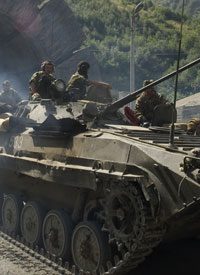
Entitled "Georgia Claims on Russia War Called Into Question," the New York Times report cites international monitors who question the amount of diligence exercised by Georgian forces as they fired upon Tskhinvali, the capital of the breakaway region of South Ossetia. The Georgian position has been that its rocket and artillery attacks on Tskhinvali were necessary defensive measures to stop heavy Ossetian shelling of Georgian villages, to stop anti-Georgian turmoil, and to prevent Russia from asserting control over the disputed region. Georgia also assured the world that it had exercised maximum discretion during the bombardment in order to minimize civilian casualties.
According to the Times, however, an international team of monitors working under the mandate of the Organization for Security and Cooperation in Europe (O.S.C.E.) reported that during the first hour of the bombardment on August 7 and August 8 at least 48 rounds landed in a civilian area of Tskhinvali. The monitors’ report also states that they have been unable to verify that ethnic Georgian villages in Ossetia were under heavy bombardment the evening of the attack, which serves to negate one of Georgian President Mikheil Saakashvili’s principal justifications for launching the attack.
The Times article noted that the monitors’ observations were shared during "two confidential briefings to diplomats in Tbilisi, the Georgian capital, one in August and the other in October. Summaries were shared with The New York Times by people in attendance at both."
The article quoted Ryan Grist, who was a former British Army captain who was the senior O.S.C.E. representative in Georgia when the conflict started. Grist said that during the evening of the bombardment, he was in constant contact with all sides including the office in Tskhinvali and with Wing Commander Stephen Young, the retired British military officer who leads the monitoring team. He said: "It was clear to me that the attack [by Georgia] was completely indiscriminate and disproportionate to any, if indeed there had been any, provocation. The attack was clearly, in my mind, an indiscriminate attack on the town, as a town."
The difficulty in ascertaining the legitimacy of one side versus the other in any international conflict is always a challenge, and increases with geographic distance and unfamiliarity with the history of the parties to the dispute. Conflicts in parts of the world with a long history of rivalry and animosity among assorted ethnic groups are often all but impossible for the outsider to fathom. The conflict in Georgia is an excellent case in point. Besides Georgians and Russians, Ossetians and Abkhazians are also involved. Even if intervention were practical (and constitutionally permissible), on whose side should we intervene?
Practical reasons alone suggest the wisdom of outside parties avoiding participation in such internecine conflicts. It would not have been wise for one who was neither a Hatfield nor a McCoy to have become involved in one of their family feuds! When entire nations are involved, the risk is correspondingly greater. Our first president, George Washington, warned his countrymen and descendants in his much-quoted Farewell Address about the subject of permanent foreign alliances. "Why," he asked, "by interweaving our destiny with that of any part of Europe, entangle our peace and prosperity in the toils of European ambition, rivalship, interest, humor, or caprice?"
Though the United States involved itself in temporary alliance during both world wars, it was in 1949, when our government, as a founding member of NATO, violated the wise advice offered by our first president and became involved in an alliance that was not only entangling, but permanent. Participation in NATO is more than unwise, however. With membership in NATO (as defined in Article 5 of the North Atlantic Treaty), an attack on any one of a group of nations would drag the United States into a war with or without a congressional declaration — as our Constitution requires.
Americans originally accepted this clear-cut violation of our Constitution and loss of sovereignty in the aftermath of World War II, out of fear that the Soviet Union would use its military might to overrun a Europe still recovering from the war. But the removal of the Iron Curtain and the end of the Cold War elimated that rationale for NATo and should prompted its dismantling. Instead, NATO has been expanded over the years (both before and after the end of the Cold War) from its original 12 members to 26 today. Among the nations being suggested for future NATO membership is none other than Georgia.
During the recent presidential campaign, both John McCain and his running mate, Sarah Palin, advocated NATO membership for Georgia, as has President Bush.
As for that great advocate of "change," President-elect Barack Obama, he stated on March 3 regarding NATO and the upcoming Bucharest summit:
Ukraine and Georgia have also been developing their ties with NATO. Their leaders have declared their readiness to advance a NATO Membership Action Plan, MAP, to prepare for the rights and obligations of membership. They are working to consolidate democratic reforms and to undertake new responsibilities in their relationship with the Alliance. I welcome the desire and actions of these countries to seek closer ties with NATO and hope that NATO responds favorably to their request, consistent with its criteria for membership.
Obama continued:
NATO stands as an example of how the United States can advance American national security – and the security of the world – through a strong alliance rooted in shared responsibility and shared values. NATO remains a vital asset in America’s efforts to anchor democracy and stability in Europe and to defend our interests and values all over the world.
Barack Obama will deliver his inaugural address on January 20, but now might be an excellent time to pay special attention to the words of Thomas Jefferson, given during his first inaugural address, March 4, 1801, when he advocated, "peace, commerce, and honest friendship with all nations, entangling alliances with none."
— AP Images


